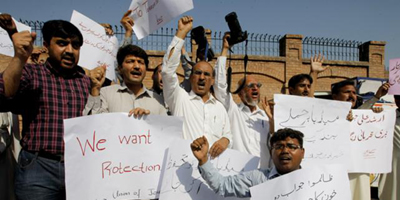Human Rights Watch urges Pakistan to end clampdown on free speech, dissent
JournalismPakistan.com | Published: 27 January 2016
Join our WhatsApp channel
Human Rights Watch has urged Pakistan to repeal laws that restrict free expression and dissent. The organization highlights the growing threats faced by journalists and activists from both state and militant groups.Summary
NEW YORK - Pakistani journalists and activists faced an increasingly hostile climate in 2015 due to harassment, threats, and violence from both state security forces and militant groups, Human Rights Watch said Wednesday in its World Report 2016. The government, under pressure from the military, placed new restrictions on the speech and funding of civil society groups.
In the 659-page World Report 2016, its 26th edition, Human Rights Watch reviews human rights practices in more than 90 countries. In his introductory essay, Executive Director Kenneth Roth writes that the spread of terrorist attacks beyond the Middle East and the huge flows of refugees spawned by repression and conflict led many governments to curtail rights in misguided efforts to protect their security. At the same time, authoritarian governments throughout the world, fearful of peaceful dissent that is often magnified by social media, embarked on the most intense crackdown on independent groups in recent times.
“Pakistan should reverse course and repeal or amend laws curbing freedom of expression and association,” said Brad Adams, Asia director. “The government should never use the threat of extremist violence as a pretext to violate the rights of independent voices.”
The Taliban and other armed groups threatened media outlets and targeted journalists and activists for their work. However, Pakistani media were deterred from reporting on or criticizing human rights violations by the military in counterterrorism operations.
In December 2014, the Islamist armed group Tehreek-e-Taliban, the Pakistani Taliban, attacked a school in Peshawar in northwestern Pakistan, leaving 148 dead, almost all of them children. The government responded with a national action plan to fight terrorism, including tactics that violated basic rights. Authorities established the use of military instead of civilian courts in terrorism cases. The government also ended an unofficial moratorium on capital punishment; 327 people were executed in 2015, among the highest toll in the world.
Abuses by security forces particularly following the Peshawar attack led to thousands of Afghans living in Pakistan to return to Afghanistan or flee elsewhere. Religious minorities faced violent attacks, insecurity, and persecution – largely from Sunni extremist groups – which the government failed to address. The government continued to use blasphemy laws to institutionalize discrimination against religious minorities.
The government’s October “Policy for Regulation of INGOs in Pakistan” required all international nongovernmental organizations and domestic groups receiving foreign funding to register and obtain prior permission to carry out any activities in the country and restricted their operations.
The cybercrimes bill proposed in 2015 includes provisions that allow the government to censor online content, criminalize Internet user activity, and access Internet users’ data without judicial review. YouTube, banned by the government since September 2012 for hosting “blasphemous content,” remained blocked in 2015.
“Pakistan’s government should take urgent steps to create an enabling environment for free expression and association,” Adams said. “Pakistan needs to fight terrorism, but denying its citizens fundamental freedoms and due process rights is an unlawful and extremely misguided approach.” - HRW news release
KEY POINTS:
- Human Rights Watch reports increased harassment of journalists and activists in Pakistan.
- Pakistan's government has imposed new restrictions under military pressure.
- Violence against media outlets by militant groups has escalated.
- Thousands of Afghans fled Pakistan due to security force abuses.
- Government policies have restricted civil society operations and freedom of expression.

























